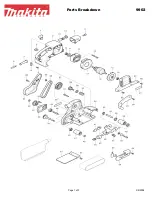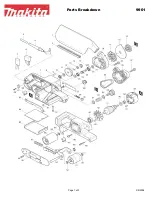
14
W H I T E
A X M I N S T E R
W
Identification and Description of the Grinder...
Grinding
Essentially a double ended motor, with a mounting base, the motor
machine
flanges mount the wheel guard at the dry stone end and the transition
gearbox at the wet stone end. The motor base contains the On/Off NVR
switch.
Wheel guard
A formed metal guard that encloses the grinding wheel. It is formed in
three parts. The inner part is mounted onto the motor flange, The stone
cover is 'sprung' into the lip of the inner part and the outer part is
located on it. The whole assembly is bolted together. There are various
'hard point locations' that accept the fixing bolts that secure the
attachments of the machine.
Tool rest
Formed metal plate that bolts onto a hard point on the inside cover of
the wheel guard. There is an elongated slot in the rest which gives
adjustment along the coach bolt fixing.
Eye shield/
Clear protective shield that mounts over the grindstone to afford a
spark guard
view of the workpiece, but offer protection for the eyes; it is mounted
onto the spark guard making a complete assembly that bolts through a
hard point on the upper part of the stone cover. The spark guard itself
has an elongated slot to allow positioning and adjustment as the wheel
diameter decreases. Its' function is to contain any material (esp.sparks)
that would be tracked around the grindstone and sprayed out of the
machine esp. over the hands.
Gearbox
A transition (through 90˚) gearbox that is mounted onto the end flange
of the motor. The gearbox reduces the speed of the wet stone to approx.
120 rpm.
Water trough
An moulded plastic trough that is screwed to the o/p face of the
gearbox. During operation the trough is filled with water, and the stone
runs partially immersed., This self dousing action maintains the 'cold
temperature' of the stone and helps to remove the grinding waste from
the face of the stone. There are a number of preformed notches in the
lip of the trough that can be used to rest/steady objects being offered
up to the stone. (See page 11) There is a shaped rubber plug, which
also acts as a stabilising support for the grinder as well as blocking the
drain hole. (See fig 3)
ON/OFF switch
A NVR double button switch panel, marked 'I' for On and 'O' for Off. The
NVR function ensures the machine will not be left in the 'ON' condition,
in the event of a power failure, and subsequent re-establishment of the
supply.
Hold down holes
Six 8mm holes set in a matrix in the corner flanges of the chassis to
enable the grinder to be bolted down to the bench or a stand.
Tool Jig
The tool Jig assembly consists of three parts; the cast iron support,
assembly
support bar and tool jig. The cast iron support has two clamping knobs
to allow the mounting bar to be raised or lowered. The steel support bar
has an adjustable nut to set the desired height required. The tool jig
slides onto the support bar, where a clamping knob on top of the jig
assembly clamps a plane iron or bevel edge chisel and keeps the blade
square to the surface of the stone, ensuring a square edge to your tool.






































